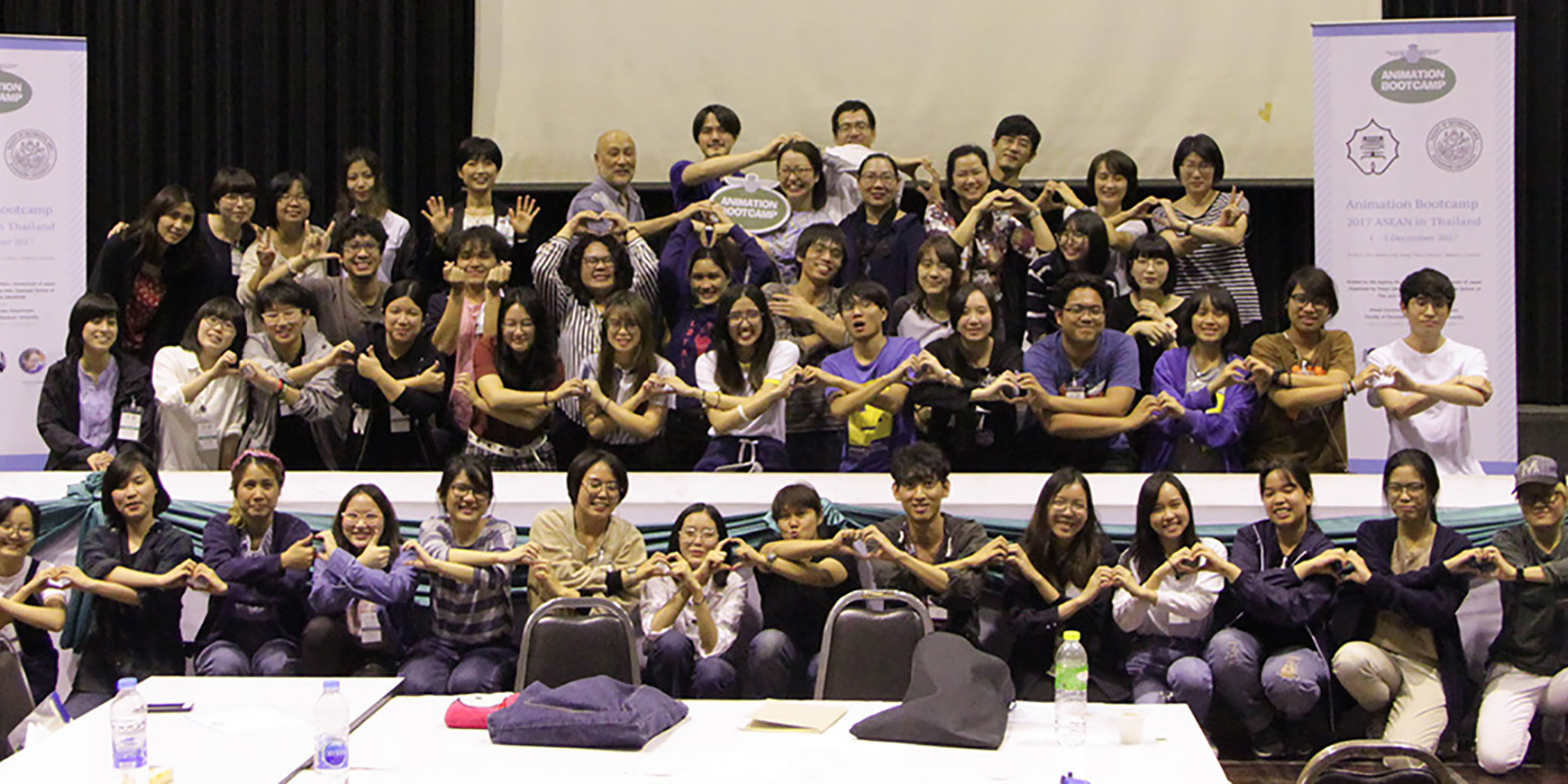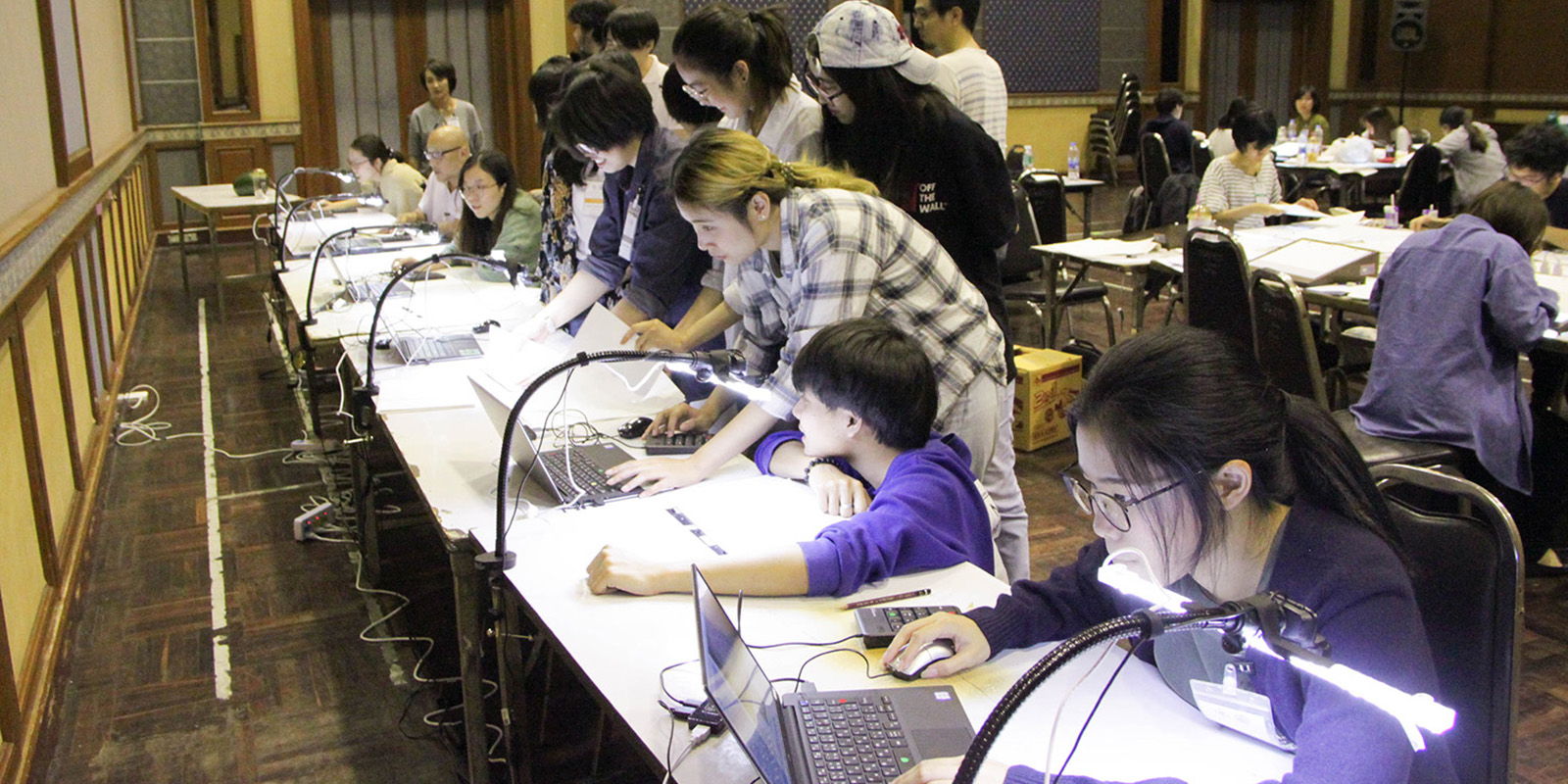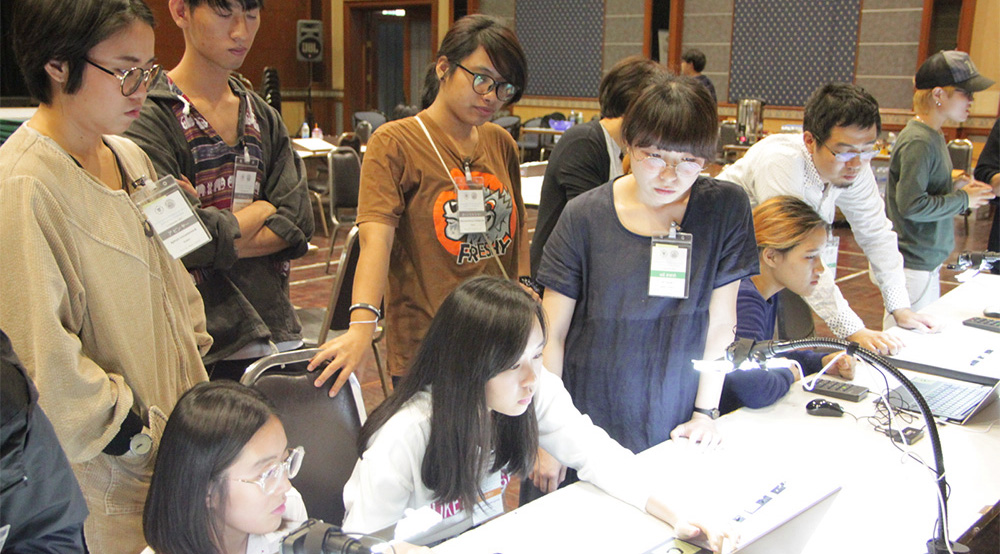Background and Objectives
Thailand is one of the ASEAN countries where Japanese animation is most well-received. Research conducted in 2017 found that Thailand had the 11th highest number of overseas contracts (for television, film, videogram, streaming, merchandizing, etc.) with Japanese animation production companies and far surpassed other ASEAN countries including the Philippines, Vietnam, and Singapore, which ranked 17th, 18th, and 19th, respectively.*1
Looking also at their history, Japan and Thailand have had a deep relationship in the animation realm. Kantana Animation Studios of the Kantana Group, which is Thailand’s largest and oldest film production studio, started out as a subcontracting company for Japan’s Toei Animation. Kantana Animation Studios later shifted towards producing 3DCG, and in 2006 produced Thailand’s first animated feature film, Khan Kluay, followed by two more animated feature films and TV series.
Aside from Kantana, many other small and medium-sized animation production studios have sprung up recently and promise further development of the industry. The younger generation is behind this new wave in animation production, and studios such as Igloo Studio, which we visited for this project, have begun to produce feature-length animated films on their own initiative.
Human resource development for animation is being undertaken at this project’s partner organization Silpakorn University and educational institutions throughout Thailand, which teach animation and provide talent to animation production studios like those mentioned above. However, animation production in Thailand is still young, and curricula development for specialized education in animation and faculty training remain as issues to be addressed.
In response to this situation, we started a hands-on workshop where we dispatched three prominent professional animators from Japan to teach the basics of animation expression to local young talents in Thailand. The curriculum and teaching methods were based on the Animation Boot Camp workshops, which have been held since fiscal 2012 by the Agency for Cultural Affairs as one of their media arts projects.*2
Animation Boot Camp is an educational program that aims to“ train talent who can seek personal growth and development.” It teaches the basics and essentials of animation and emphasizes the importance of“ observing” and“ feeling” through one’s own body and the pursuit of“ expression that communicates to others.” Instructors were comprised of Japan’s top animators who are rarely able to make public appearances and the workshop allowed students to receive direct guidance from them. By conducting the workshop in Thailand, we aimed to inspire local young talents and give them an in-depth understanding of Japanese animation.
The first Animation Bootcamp held in Thailand in 2015 was very well received by participating students and faculty members from local universities, and tangible outcomes included participants going on to receive critical acclaim at film festivals.*3 The second workshop was held in 2016 in response to many requests from the Thailand side. We tried out a new idea in the workshop execution, namely the dispatch of Tokyo University of the Arts graduate students as tutors, and we received even more positive feedback regarding cultural exchange among students. Other advantages of continuing the workshop became manifest as Thai students who participated the first year supported us as assistants in the second year. We followed up with the third Animation Bootcamp in Thailand this year.
Team
| From Japan | |
|---|---|
| Instructors | Kiyotaka Oshiyama [Animator] |
| ryo_timo [Animator] | |
| Momoko Yamada [Animator/Tezuka Productions Co., Ltd.] | |
| Assistant Instructor | Nuchanart Rungtrakool [Animator/Production I.G, Inc.] |
| Directors | Koji Takeuchi [Animation Producer] |
| Taruto Fuyama [Professor, Tokyo University of the Arts] | |
| Project Producer | Mitsuko Okamoto [Professor, Tokyo University of the Arts] |
| Project Manager | Asako Eguchi [Project Assistant Professor, Tokyo University of the Arts] |
| Interpreter | Rinyaphat Phattaratheeda Mukkie |
| Planning and Administration | Tokyo University of the Arts, Graduate School of Film and New Media |
| General Management | UNIJAPAN |
| Project Chief | Takenari Maeda [Director] |
| Project Administrator | Kiyomi Nakazaki [International Promotion Group] |
| Project Administrator | Machiko Komatsu [International Promotion Group] |
| From Thailand (Silpakorn University) | |
|---|---|
| Local Project Producer | Chanisa Changadvech [Chair of Visual Communication Design Department, Faculty of Decorative Art] |
| Staff | Chitchai Kuandachakupt [Product Design Department, Faculty of Decorative Art] |
| Chotiwat Punnopatham [Visual Communication Design Department, Faculty of Decorative Arts] | |
| Atiwat Wiroonpetch [Visual Communication Design Department, Faculty of Decorative Arts] | |
| Supitchaya Khemthong [Visual Communication Design Department, Faculty of Decorative Arts] | |
| Kanitta Meechubot [Visual Communication Design Department, Faculty of Decorative Art] | |
| Coordinator | Sutasinee Vajanavinij [Visual Communication Design Department, Faculty of Decorative Art] |
| Assistants to the Instructors (Graduates of Silpakorn University, etc.) | Panida Ratarasan [2016 participant] |
| Atikan Intharasukphon [2016 participant] | |
| Nichakarn Rojanadamkerngchoke [2016 participant] | |
| Ploypapat Phusadeekunpaisan [2016 participant] | |
| Thanyanan Jirasatitworakul [Illustrator/Comic Artist/assistant staff member in 2015] | |
| Tunyakarn Anucharchart [Illustrator/Comic Artist/assistant staff member in 2016] | |
| Vasan Suwanaka [Illustrator/assistant staff member in 2015] | |
Instructor Profiles
-
Kiyotaka Oshiyama (Animator)
-
ryo_timo (Animator, Animation Director, Illustrator)
-
Momoko Yamada (Animator, Tezuka Productions Company Limited)
Project Overview
《Project Name》
Animation Boot Camp 2017 ASEAN
《Dates》
December 1 (Fri.) to 3 (Sun.), 2017
《Venue》
Silpakorn University, Wang Thapra Campus
《Program Content》
Day 1 (December 1st)
09:50-10:00 Opening Ceremony
10:00-10:05 Orientation (Director Takeuchi)
10:05-10:15 Making Cutout Dolls
10:15-10:25 Walking Exercise (Director Takeuchi)
10:25-11:30 Lecture on Walking Animation(Mr. Oshiyama)
10:30-12:10 Animate Walking
12:10-12:15 Screening of Walking Animation
12:15-12:20 Lecture on Animating Walking(Mr. Oshiyama)
12:20-12:30 Review of Walking Animation
12:30-13:30 Lunch
13:30-14:40 Revision of Walking Animation
14:40-14:50 Screening of Revised Walking Animation
14:50-15:05 Review of Walking Animation(Mr. Oshiyama)
15:05-15:20 Break
15:20-15:30 Explanation of Assignment(Director Takeuchi)
15:30-16:05 Theater Game (Mr. ryo_timo)
16:05-17:30 Discussion to Decide the Storyline
Day 2 (December 2nd)
09:00-09:30 Storyboard Creation
09:30-09:40 Advice for Animation Expression(Director Takeuchi)
09:40-12:30 Animate Draft Drawings
12:30-13:30 Lunch
13:30-13:40 Screening of Draft Animations
13:40-17:30 Animation Production
Day 3 (December 3rd)
09:00-09:30 Animation Production
09:30-09:40 Screening of Works in Progress
13:00-14:00 Lunch
14:00-14:45 Screening of Kacchikenee!(Ms. Yamada)
14:45-15:20 Screening and Review of Finished Works
15:20-17:00 Q&A
17:00-18:00 Closing Ceremony (presentation of Certificate of Completion, photo session)
《Participants》
Participants: 31 students
・25 Thai students
・6 graduate students from Tokyo University of the Arts
Students’ University Affiliation:
Silpakorn University
・Visual Communication Design Department, Faculty of Decorative Arts (14 students)
・Animation, ICT (3)
Silpakorn University International College
・Faculty of Digital Communication Design (3)
King Mongkut’s University of Technology Thonburi
・Media Arts (3)
King Mongkut’s Institute of Technology Ladkrabang
・Film and Digital Media (2)
Tokyo University of the Arts
・Graduate School of Film and New Media, Department of Animation (6)
Questionnaire Responses from Workshop Participants
- Was this workshop interesting?
-
It was very interesting. 75%(18人)
It was interesting to a certain degree. 25%(6人) - Were you able to understand the content of this workshop well?
-
I was able to understand fully. 83.3%(20人)
I was able to understand to a certain degree. 16.7%(4人) - Was the curriculum appropriate?
-
It was very appropriate. 50%(12人)
It was appropriate to a certain degree. 45.8%(11人)
No response 4.2%(1人) - Were the instructions given in the workshop appropriate?
-
It was very appropriate. 79.2%(19人)
It was appropriate to a certain degree. 20.8%(5人) - Do you think that what you learned in this workshop will be useful in your future projects?
-
It will be very useful. 83.3%(20人)
It will be useful to a certain degree. 16.7%(4人) - Please list some of the things you have learned in this workshop. (Free answer in English.)
-
・ The entire 2D animation process from storyboards to animation
・ How much Japanese animation requires a sense of reality and how much detail is required
・ The correct body composition for character movement
・ Observing movement that I’d never noticed
・ How to create an interesting storyboard
・ How to work with others in a group
・ Knowledge that I can apply to my own 2D animation production
・ How to make analog animation (I fell in love with this method)
・ How to think about what I most want to draw, and methods for revising and completing the work
・ How to create natural key poses
・ Thinking in detail about character movement
・ How to convey a story
・ How to create motivation behind character reaction
・ Methods for expressing emotion through movement
・ Methods for animating a person who is walking
・ Methods used by Japanese animators
・ About rhythm
・ Thinking about the story before I start drawing; this makes me more attentive and enables me to create better drawings
・ I deepened my understanding of how human bodies move.
・ I was able to overcome a weakness of mine by learning a lot about movement.
・ Methods for observing how humans move
・ Methods for working efficiently
・ The importance of talking with my team
・ I learned how difficult it is to create a single scene and I feel proud of the finished work. - Comments and responses to the workshop
-
・ I really learned a lot about 2D animation.
・ I liked working with other people and seeing the work created by other groups. That enabled me to gain lots of new knowledge and ideas.
・ This was a wonderful workshop! It was fun and I wanted to learn more. During these three days, I gained a genuine desire to continue creating 2D animation. The instructors were very kind and nice. Thank you for taking care of us!
・ I really like Mr. ryo_timo. I wasn’t able to communicate directly with him, but he poured his heart into improving our work. This workshop was simple, but it was very effective.
・ This workshop was wonderful!
・ This workshop was very good. I did my best personally and had a great time! I tried to do things that I’d thought were impossible for me.
・ Japanese sweets are really delicious! I had fun working with friends I’d met for the first time. The instructors were all very cute and gave us great feedback. Thank you.
・ I wanted more interpretation so I could get a better understanding of the instructors’ explanations. I would really like to thank Ms. Momoko. She was so nice and cute and helped me a lot.
・ I wanted the workshop to be longer so I could learn more techniques. I’m glad I could learn about animation that really communicates effectively and about the state of the animation industry in Japan.
・ Everything about this workshop was really great.
・ This workshop program was great. How about selling this program?
・ I wanted to talk more with the Japanese students and other groups. I wanted more time. I’d like to try animating other types of movement.
・ Thank you so much. I’m glad that I could have many different experiences and learn about animation from everyone.
Conclusions
In this third year of the Book Camp workshop, we have enhanced the quality of this program for cultural exchange and collaboration through on-going improvements based on past experience. The key points of this year’s project in the animation field are summarized below.
・ For last year’s Boot Camp, two of the three instructors were part of the workshop for the previous year, and they represented a mixture of seasoned and up-and-coming animators. In contrast, the three instructors selected this year (partly for scheduling reasons) were young animators with no previous Bootcamp experience in Thailand. We were a little concerned at first, but, partly owing to the thorough meetings prior to the departure from Japan, the choice of instructors presented no problems. Also, the young instructors’ familiarity with digital technology resulted in unprecedented changes in the Book Camp, including numerous questions during the Q&A session about digital animation and 3DCG. Also, the participation of a female animator for the first time was a positive contribution to diversity at the workshop.
・ The administration of the workshop went without a hitch thanks to the established tradition of former participants joining as support staff members, who have an indepth understanding of the workshop. Also, last year there were issues because Tokyo University of the Arts students participated for the first time and the workload was not distributed evenly, which left the Thailand support staff members with time on their hands. In response, this year we had frequent meetings with the Thailand support staff and made a point of assigning well-defined roles, such as sole responsibility for giving instructions to all of the students. Consequently, they did a great job as team leaders and allowed the Tokyo Geidai students to focus on the animation assignments, which in turn improved the quality of the final works.
・ We implemented a new idea of asking the students to add their own vocalizations as sound effects during the screening of their finished pieces. The screening was quite enlivened as a result, and the students seemed to more strongly experience the joy of sharing their own animations with others.
・ Up until this year, we didn’t have an opportunity to talk with faculty members from the participating universities other than Silpakorn University and the animation industry associates who came to see the workshop. As a remedy, we asked them to allocate two hours on the day following the workshop for an opinion-exchange session. The discussions were substantial and benefited both sides. All the participants, from educational institutions and industry alike, thought highly of the Boot Camp content.
・ After the conclusion of the workshop we visited a vibrant studio founded by up-andcoming animation producers in Thailand. There we learned that far from being content with subcontracts from abroad, the animation industry in Thailand has great potential for creating original productions with appeal to foreign markets. We also learned that former Boot Camp participants are working as production staff on projects like these.
・ We learned that every year former Boot Camp participants utilize their experiences the workshop to produce graduation pieces that earn high acclaim at competitions and film festivals. Given these tangible outcomes, our Thailand side partners expressed a strong desire for us to continue holding the Boot Camp workshops in the future.
In summary, we conclude that the project was an overall success. Our mutual trust with the Thai staff members has been further strengthened, and there are high expectations to continue holding the workshop and develop the project even further.


